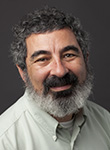Make STEM grad school relevant, says Cornell's Lewenstein
By Anne Ju

A national effort to rethink how graduate students in science, technology, engineering and math (STEM) fields are trained was the topic of a Feb. 14 American Association for the Advancement of Science (AAAS) panel that included remarks from Bruce Lewenstein, Cornell professor of science communication.
Lewenstein, a professor in the departments of Communication and Science and Technology Studies, participated in the AAAS symposium titled “Building National Capacity in Science Communication for STEM Graduate Students.”
Speakers addressed the challenges of helping next-generation scientists recognize the “so what?” of their science, how to equip them to share it with varied audiences and the ways graduate education could be improved to this end. In particular, a 2013 COMPASS survey of communications training opportunities for STEM graduate students was discussed.
Lewenstein’s remarks included information on Cornell’s efforts to make graduate school relevant no matter what careers students choose.
“We know that nationally, about 50 percent of STEM Ph.D.s do not end up in traditional academic or research positions,” said Lewenstein, whose research interests include the public understanding of science and the popularization of science.
Among Cornell’s efforts in STEM graduate student education is a new National Institutes of Health-funded program based at the College of Veterinary Medicine and the Graduate School called BEST (Broadening Experiences in Science Training), which is exploring a new model to train graduate students.
Lewenstein also participated in a Feb. 15 AAAS panel titled “How to Rebuild Informed Trust in Science: Insights from Social Sciences.” His remarks explored how divergent definitions of “public engagement” in science affect issues of public trust in science.
Media Contact
Get Cornell news delivered right to your inbox.
Subscribe